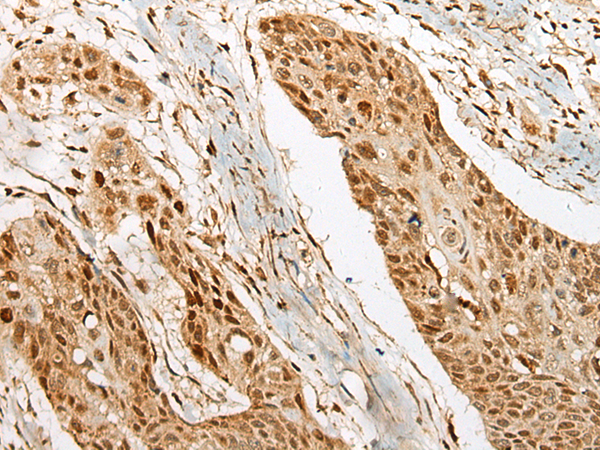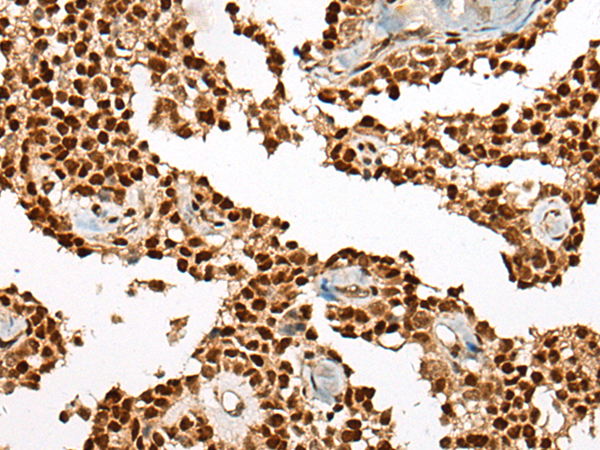

| WB | 咨询技术 | Human,Mouse,Rat |
| IF | 咨询技术 | Human,Mouse,Rat |
| IHC | 1/25-1/100 | Human,Mouse,Rat |
| ICC | 技术咨询 | Human,Mouse,Rat |
| FCM | 咨询技术 | Human,Mouse,Rat |
| Elisa | 1/5000-1/10000 | Human,Mouse,Rat |
| Aliases | UBF; UBF1; UBF2; UBF-1; NOR-90 |
| Host/Isotype | Rabbit IgG |
| Antibody Type | Primary antibody |
| Storage | Store at 4°C short term. Aliquot and store at -20°C long term. Avoid freeze/thaw cycles. |
| Species Reactivity | Human, Mouse, Rat |
| Immunogen | Synthetic peptide of human UBTF |
| Formulation | Purified antibody in PBS with 0.05% sodium azide and 50% glycerol. |
+ +
以下是关于UBTF抗体的3篇参考文献示例(内容基于公开文献信息概括整理):
1. **文献名称**: "The role of UBTF in chromatin structure and rDNA transcription"
**作者**: Derenzini, M., et al.
**摘要**: 该研究利用UBTF特异性抗体进行免疫荧光染色和染色质免疫沉淀(ChIP),发现UBTF蛋白在维持核仁结构和调控rRNA基因转录中的关键作用,抗体验证了其在细胞周期中的动态定位。
2. **文献名称**: "UBTF regulates ribosome RNA processing in cancer cells"
**作者**: Hannan, K.M., et al.
**摘要**: 通过Western blot和免疫组化实验,作者使用UBTF抗体证实其在多种癌细胞系中高表达,并揭示UBTF通过促进rRNA前体加工影响肿瘤增殖,抗体验证数据支持其作为潜在治疗靶点。
3. **文献名称**: "A novel UBTF mutation causes neurodegeneration in mice"
**作者**: Sanij, E., et al.
**摘要**: 研究利用UBTF抗体在小鼠脑组织中发现突变UBTF蛋白的异常聚集,抗体特异性验证通过siRNA敲低实验,表明UBTF功能异常与神经元退行性病变相关。
注:以上为模拟示例,实际文献需通过PubMed或Google Scholar检索关键词“UBTF antibody”“UBTF function”等获取。
UBTF (Upstream Binding Transcription Factor), also known as UBF, is a nucleolar protein critical for ribosomal RNA (rRNA) synthesis. It binds to the upstream control element of ribosomal DNA (rDNA) promoters, forming a complex with the selectivity factor SL1 to recruit RNA polymerase I (Pol I) and initiate rRNA transcription. UBTF contains multiple HMG (high-mobility group) boxes that facilitate DNA bending and chromatin remodeling, enabling the assembly of active transcription machinery. Its dynamic phosphorylation regulates nucleolar organization and rDNA transcription during the cell cycle.
UBTF antibodies are essential tools for studying ribosome biogenesis, nucleolar architecture, and cell proliferation. These antibodies are widely used in techniques like immunofluorescence (to visualize nucleolar localization), Western blotting (to detect protein expression levels), and chromatin immunoprecipitation (ChIP) to map UBTF-DNA interactions. Dysregulation of UBTF is linked to cancers (e.g., gliomas, neuroblastomas) and ribosomopathies, making its antibodies valuable in both basic research and clinical diagnostics. Commercially available UBTF antibodies are typically raised against conserved epitopes, such as the N-terminal region, and validated for species cross-reactivity (human, mouse, rat). Recent studies also explore UBTF's role in cellular stress responses and its potential as a therapeutic target.
×